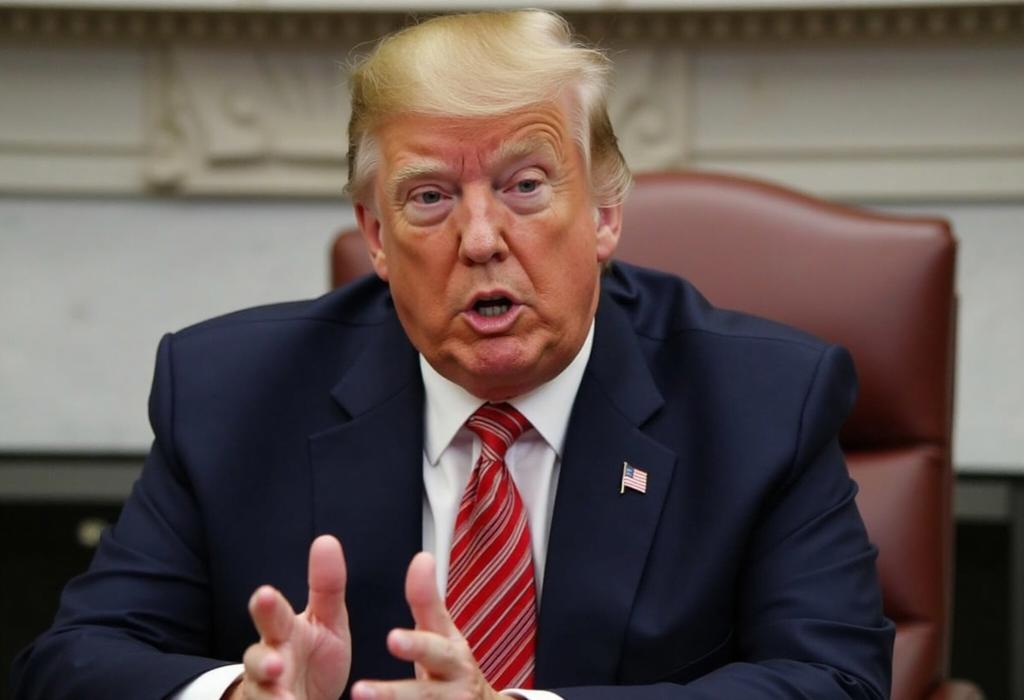In an eventful public appearance on Friday, President Donald Trump delivered a sharp critique of Federal Reserve Chair Jerome Powell, highlighting his discontent with the current state of U.S. monetary policy. Trump stated that if the Fed were led by someone who truly understood economic dynamics, interest rates would be lower. This comment came as part of a broader conversation in which the President underscored what he perceives are missteps in the Fed's approach to managing inflation and market trends.
During a detailed question-and-answer session with reporters, Trump pointed to falling prices as evidence that the economy could benefit from a change in leadership at the Fed. His remarks, including a pointed reference on social media where he labeled Powell with the nickname 'Too Late', illustrate his ongoing frustration and his tendency to use provocative language to underscore his policy disagreements.
Adding to the tension, White House economic adviser Kevin Hassett mentioned that the administration is actively exploring every option, including a potential removal of Powell—a possibility that legal experts note is highly unlikely given the Fed Chair's statutory protections. Powell, for his part, has reiterated his commitment to serve until the end of his term in May 2026, emphasizing the independence of the Federal Reserve and its dual mandate of managing both employment levels and price stability.
Powell’s more measured responses, delivered during remarks at the Economic Club of Chicago, stood in stark contrast to the administration’s more aggressive tone. He warned that the tariff policies pushed by President Trump might further complicate the Federal Reserve’s path by fueling inflation, a situation that could disrupt the balance between maintaining high employment and controlling price increases. This careful analysis reflects a broader consensus among certain economists and market analysts that fiscal and monetary policies need rigorous coordination.
The unfolding dialogue has sparked a broader debate across the political spectrum. Notable opposition voices, including Senator Elizabeth Warren, warned that tampering with the tenure of such a critical economic leader could have destabilizing repercussions for U.S. financial markets. Meanwhile, sources like Reuters and CNBC, along with financial instruments such as CME’s FedWatch tool, have provided additional context by underscoring market expectations for the next Federal Open Market Committee meeting where rates are likely to remain steady.
For our subscribers, this situation serves as a vivid example of how political debates over economic policy can blur the lines between partisan rhetoric and the operational realities of key financial institutions. While the White House’s contentious style and use of satirical labels such as 'Too Late' contribute to an atmosphere of political theater, reputable sources and expert commentary also highlight that the Federal Reserve operates under stringent legal frameworks designed to insulate it from transient political pressures. This ensures that monetary policy decisions remain grounded in economic analysis rather than the vicissitudes of political agendas.
In synthesizing reports from multiple credible outlets and firsthand remarks from both Trump and Powell, it is clear that this is more than just a clash of personalities. It is an evolving narrative about the interplay between politics and the independence of central banking. As the debate intensifies, stakeholders and observers are reminded of the critical importance of maintaining institutional integrity in economic governance—a factor that remains essential regardless of shifting political tides.
Our analysis draws on sources such as Reuters, CNBC, and direct social media posts from President Trump as well as statements from key figures like Kevin Hassett and Senator Elizabeth Warren. These multiple perspectives offer our readership a holistic view of the internal tensions and policy debates shaping the economic landscape today.
AD
AD
AD
AD
Bias Analysis
Bias Score:
40/100
Neutral
Biased
This news has been analyzed from 21 different sources.
Bias Assessment: The overall bias score is 40, reflecting a moderate level of bias. While the article includes strongly opinionated language from the Trump administration, it balances this by presenting counterpoints from experts like Powell and Senator Warren. The use of sources such as Reuters and CNBC further mitigates the bias, although the framing of the events—especially the emphasis on provocative statements—introduces a mild partisan tint.
Key Questions About This Article




